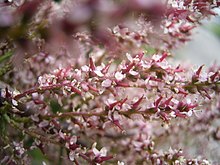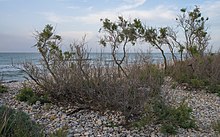Tamarix gallica, also known as the French tamarisk,[2] is a deciduous, herbaceous, twiggy shrub or small tree reaching up to about 5 meters high.
| Tamarix gallica | |
|---|---|

| |
| Scientific classification | |
| Kingdom: | Plantae |
| Clade: | Tracheophytes |
| Clade: | Angiosperms |
| Clade: | Eudicots |
| Order: | Caryophyllales |
| Family: | Tamaricaceae |
| Genus: | Tamarix |
| Species: | T. gallica
|
| Binomial name | |
| Tamarix gallica | |
| Synonyms | |
| |

It is indigenous to Saudi Arabia and the Sinai Peninsula, and very common around the Mediterranean region. It is present in many other areas as an invasive introduced species, often becoming a noxious weed.[2] It was first described for botanical classification by the taxonomist Carl Linnaeus in 1753, but had already been in cultivation since 1596.[3]
Description
editIt has fragile, woody branchlets that drop off in autumn along with the small, scale-like leaves that cover them. The leaf-shape is an adaptation over time to exceedingly dry conditions.[3]
The pink flowers are tiny, hermaphroditic, and are borne on narrow, feather-like spikes. They frequently bloom earlier than the leaves, first in May, and sometimes a second time in August.[3]
In its native range the plant grows in moist areas such as riverbanks, especially in saline soils.[4] It has been grown as an ornamental plant for its profuse production of showy pink flower spikes. In Algeria and surrounding areas it has been used medicinally for rheumatism, diarrhea, and other maladies.[4] Its juice is an ingredient for Gaz, a Persian delicacy from Isfahan.
References
edit- ^ Beech, E. (2018). "Tamarix gallica". IUCN Red List of Threatened Species. 2018: e.T79928337A123870908. Retrieved 27 May 2022.
- ^ a b USDA, NRCS (n.d.). "Tamarix gallica". The PLANTS Database (plants.usda.gov). Greensboro, North Carolina: National Plant Data Team. Retrieved 8 December 2015.
- ^ a b c Eleanor Lawrence, Ed. (1985). The Illustrated Book of Trees & Shrubs. New York, NY: Gallery Books, an imprint of W.H.Smith Publishers Inc. p. 150. ISBN 0-8317-8820-8.
- ^ a b A Guide to Medicinal Plants in North Africa
External links
edit- Calflora Database: Tamarix gallica (French tamarisk) — introduced species in California.
- Jepson Manual Treatment of Tamarix gallica — introduced species.
- Tamarix gallica in the CalPhotos photo database, University of California, Berkeley
